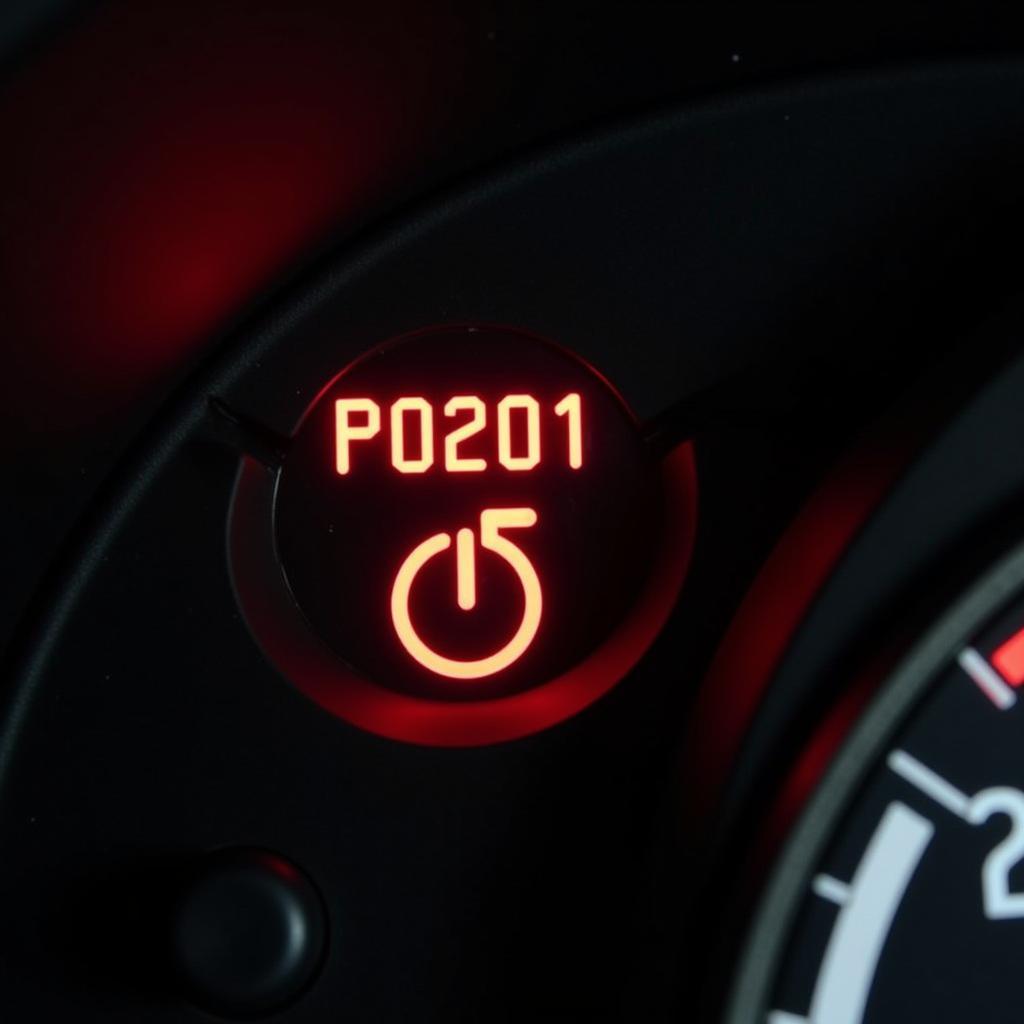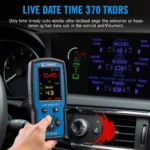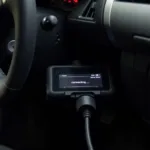The OBD2 code P0201 indicates a problem with the fuel injector circuit in your car’s engine. Specifically, it signals an issue with the circuit for fuel injector 1. This article will delve into the intricacies of the P0201 code, covering its causes, symptoms, diagnosis, and potential solutions.
Understanding the P0201 Code
Your car’s engine relies on a delicate balance of air and fuel for optimal performance. The fuel injectors play a crucial role in this process by spraying a precise amount of fuel into the combustion chamber. Each injector is controlled by the Engine Control Module (ECM) through an electrical circuit.
When the ECM detects an irregular voltage or resistance in the circuit for fuel injector 1, it triggers the P0201 code. This malfunction can significantly affect your engine’s performance and fuel efficiency.
Common Causes of a P0201 Code
A P0201 code can be caused by a variety of issues, ranging from simple electrical problems to faulty components:
- Faulty Fuel Injector: A malfunctioning fuel injector is often the culprit behind a P0201 code. It might be clogged, leaking, or have an internal electrical fault, disrupting the fuel delivery.
- Wiring Problems: Damaged, corroded, or loose wiring in the injector circuit can disrupt the electrical signals, leading to this error code.
- Faulty ECM: While less common, a faulty ECM can also be responsible for the P0201 code. If the ECM is sending incorrect signals or failing to detect the injector properly, it can trigger this error.
- Blown Fuse: A blown fuse in the fuel injector circuit can interrupt power supply and cause the P0201 code.
Recognizing the Symptoms
Identifying the symptoms of a P0201 code can help you address the problem promptly. Here are some common signs:
- Check Engine Light: The most obvious symptom is the illumination of the check engine light on your dashboard.
- Rough Engine Idle: A failing fuel injector can cause your engine to idle roughly or inconsistently.
- Misfires: The engine might misfire, especially under acceleration, due to the improper fuel-air mixture.
- Reduced Fuel Efficiency: You might notice a decrease in your car’s fuel efficiency as the engine tries to compensate for the faulty fuel delivery.
- Engine Hesitation: The engine might hesitate or stumble during acceleration due to the inconsistent fuel supply.
Diagnosing the P0201 Code
Diagnosing a P0201 code requires a systematic approach. Here’s a step-by-step guide:
- Read the Code: Use an OBD2 scanner to read the trouble code stored in your car’s ECM.
- Inspect the Wiring: Visually inspect the wiring harness connected to fuel injector 1 for any signs of damage, corrosion, or loose connections.
- Check the Fuel Injector: Test the resistance of the fuel injector using a multimeter. If the resistance is outside the specified range, the injector is likely faulty.
- Swap Injectors: Swap the suspect injector with another one and clear the code. If the code reappears with the same cylinder, the fuel injector is confirmed as the problem.
- Inspect the ECM: If other components check out, the ECM might be at fault. Consult a qualified mechanic for testing and potential replacement.
Addressing a P0201 Code
The solution for a P0201 code depends on the root cause:
- Replace the Fuel Injector: If the fuel injector is faulty, replacing it is the most effective solution.
- Repair Wiring Issues: Repair or replace any damaged, corroded, or loose wiring in the injector circuit.
- Replace the ECM: If diagnosed as faulty, the ECM needs to be replaced. Seek professional assistance for this procedure.
- Replace the Fuse: If the fuse is blown, replace it with a new one of the correct amperage.
Can I Still Drive with a P0201 Code?
While you might be tempted to continue driving with a P0201 code, it’s not advisable. Driving with a faulty fuel injector can lead to further engine damage and potentially leave you stranded.
Expert Insight
“Addressing a P0201 code promptly is crucial,” says John Smith, a seasoned automotive engineer at [Company Name]. “Ignoring this code can lead to catalytic converter damage, decreased fuel economy, and even engine failure in severe cases.”
Preventing P0201 Codes
While not all P0201 codes are preventable, these tips can help minimize the risk:
- Regular Maintenance: Adhering to your car’s recommended maintenance schedule, including fuel system cleaning, can prevent injector clogging and other issues.
- Quality Fuel: Using high-quality fuel can prevent sediment buildup in the fuel system, reducing the risk of injector problems.
- Timely Repairs: Address any electrical issues or warning lights promptly to prevent them from escalating into more significant problems.
Conclusion
The OBD2 code P0201 is a serious issue that should be addressed promptly to avoid further engine damage and costly repairs. By understanding the code, its causes, symptoms, and solutions, you can keep your car running smoothly and efficiently. If you encounter this code, don’t hesitate to seek professional help to diagnose and rectify the issue.
FAQs
Q: Can I clean a clogged fuel injector myself?
A: While there are DIY fuel injector cleaning kits available, it’s generally recommended to have a professional mechanic clean your injectors for optimal results.
Q: How much does it cost to replace a fuel injector?
A: The cost of replacing a fuel injector varies depending on the make and model of your car. However, you can expect to pay between $200 and $600 for parts and labor.
d16y8 obd2 honda fuel injectors are a common search term related to this issue. For specific information on Honda fuel injectors, you can refer to our dedicated article.
Q: How long can I drive with a P0201 code?
A: It’s not recommended to drive with a P0201 code. Continuing to drive can cause further damage to your engine and catalytic converter.
For information on other OBD2 codes or car diagnostic questions, explore our extensive resources on OBDFree.com.
Need Assistance?
Contact our 24/7 support team via WhatsApp: +1(641)206-8880, Email: [email protected].


